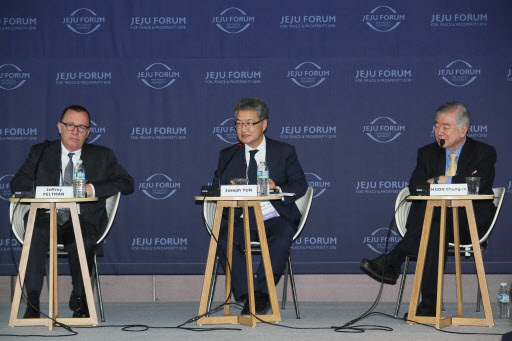'Denuclearization talks less likely to be derailed': Joseph Yun, Moon Chung-in
By Ock Hyun-juPublished : June 27, 2018 - 19:39
With North Korea and the US having taken the first step to restore trust through the Singapore summit, the high-stakes denuclearization process is less likely to be derailed, experts said Wednesday at an international forum on peace and security.
Former senior US diplomat Joseph Yun gave 4 on the scale of 0 to 10, and presidential adviser Moon Chung-in gave 2, on the possibility of the collapse of future negotiations over the denuclearization of the Korean Peninsula.
“I would say two leaders are trying to develop trust,” Yun said at a session on “denuclearization of the Korean Peninsula” during the 13th Jeju Forum held on the southern island of Jeju.
“But there is no fundamental trust and that makes it so much harder. Getting to something like complete denuclearization within next two years would be difficult task.”
US President Donald Trump and North Korean leader Kim Jong-un had the first ever US-North Korea summit on June 12 in Singapore, where they agreed to work toward “complete denuclearization” of the Korean Peninsula and the US promised to give security guarantee to North Korea.
The outcome of the summit drew criticism for being short on details including a timeframe of the denuclearization process.
Former senior US diplomat Joseph Yun gave 4 on the scale of 0 to 10, and presidential adviser Moon Chung-in gave 2, on the possibility of the collapse of future negotiations over the denuclearization of the Korean Peninsula.
“I would say two leaders are trying to develop trust,” Yun said at a session on “denuclearization of the Korean Peninsula” during the 13th Jeju Forum held on the southern island of Jeju.
“But there is no fundamental trust and that makes it so much harder. Getting to something like complete denuclearization within next two years would be difficult task.”
US President Donald Trump and North Korean leader Kim Jong-un had the first ever US-North Korea summit on June 12 in Singapore, where they agreed to work toward “complete denuclearization” of the Korean Peninsula and the US promised to give security guarantee to North Korea.
The outcome of the summit drew criticism for being short on details including a timeframe of the denuclearization process.

Yun said he had expected their agreement to be more “concrete,” calling summit a “slow start.”
“I think we are looking at probably a longer timeframe than what is commonly thought,” he said.
On the other hand, Moon Chung-in, special advisor to President Moon Jae-in for foreign affairs and national security, hailed the outcome of the summit, saying it offered a chance to narrow their gaps on what the other party has to do to resolve the North Korea’s nuclear standoff.
Moon dismissed the criticism that the two countries’ agreement fell short of including the term “complete, verifiable and irreversible” denuclearization, which the US has long demanded from the North.
“When President Moon had a discussion with Chairman Kim Jong-un, in fact, they discussed the issue in depth. Chairman Kim Jong-un understood complete denuclearization in terms of CVID,” he said, adding “complete denuclearization” encompasses dismantlement of nuclear facilities, material, weapons, as well as a verification process.
North Korea is “sensitive” to the term as the reclusive country interprets it as “surrender,“ he said.
Yun, however, said that it is unclear whether North Korea is willing to denuclearize in a complete, irreversible and verifiable manner. A verification would be key to testing North Korea’s seriousness about denuclearization, he pointed out.
“Here, I think the important thing that North Korea has to convey to us is that they are serious and they are committed to getting rid of all their nuclear weapons and missile material. To me, as yet, they haven’t conveyed it,” he said.
On the timing of easing of sanctions against North Korea, Moon and Yun agreed that the North should first declare its nuclear facilities, material and weapons for an inspection before the international community grants the isolated country sanctions relief.
“If North Korea comes up with a full list of nuclear facilities, material and weapons, maybe the South Korean government can recommend the US, China and Russia sanctions resolutions to relax sanctions on North Korea,” Moon said. “Declaration is the most important starting point.”
By Ock Hyun-ju (laeticia.ock@heraldcorp.com)
-
Articles by Ock Hyun-ju








![[Graphic News] More Koreans say they plan long-distance trips this year](http://res.heraldm.com/phpwas/restmb_idxmake.php?idx=644&simg=/content/image/2024/04/17/20240417050828_0.gif&u=)
![[KH Explains] Hyundai's full hybrid edge to pay off amid slow transition to pure EVs](http://res.heraldm.com/phpwas/restmb_idxmake.php?idx=644&simg=/content/image/2024/04/18/20240418050645_0.jpg&u=20240419100350)






![[From the Scene] Monks, Buddhists hail return of remains of Buddhas](http://res.heraldm.com/phpwas/restmb_idxmake.php?idx=652&simg=/content/image/2024/04/19/20240419050617_0.jpg&u=20240419175937)

![[KH Explains] Hyundai's full hybrid edge to pay off amid slow transition to pure EVs](http://res.heraldm.com/phpwas/restmb_idxmake.php?idx=652&simg=/content/image/2024/04/18/20240418050645_0.jpg&u=20240419100350)

![[Today’s K-pop] Illit drops debut single remix](http://res.heraldm.com/phpwas/restmb_idxmake.php?idx=642&simg=/content/image/2024/04/19/20240419050612_0.jpg&u=)